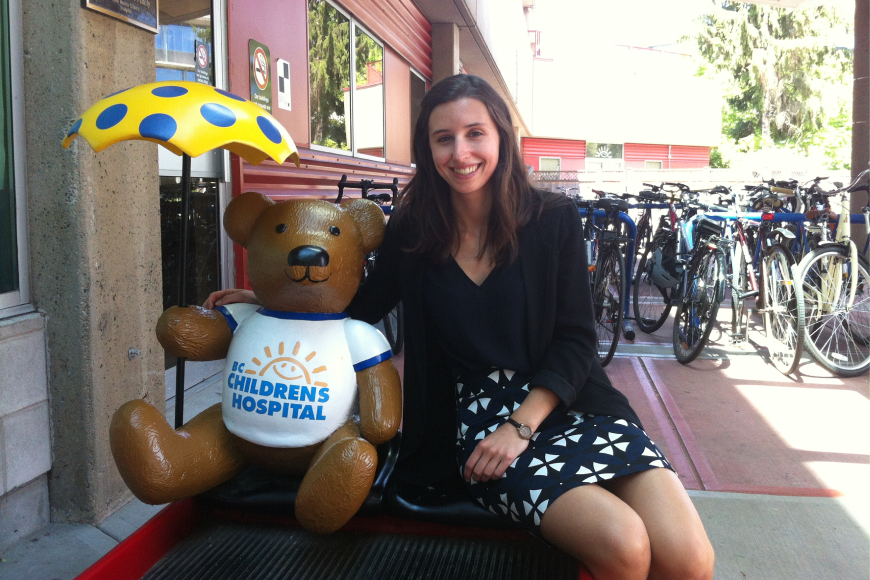
For me, co-op is about learning what I can’t learn in school. After three co-op terms, I firmly believe everyone in your workplace can – and should – be viewed as a valuable resource. Each person has something to teach you – life skills, career tips, something – you just have to figure out what it is!
One of the reasons I went into co-op is because I wanted to learn about all the “little jobs.” The less well-known ones. Everyone knows you can be a teacher, a lawyer, a pilot – but did you know you can be a dietician working in food security? Or a phlebotomist? My goal was to find out more about what careers were out there and available to me. I knew I needed to talk to as many people as possible. I wanted to find out how these professionals started and what advice they had for me: a third-year student who needed help gathering facts and anecdotal evidence to choose a career path.
The summer I began my twelve month co-op at BC Children’s hospital, we had a Student Research Day, where students from almost ten different divisions (including myself) presented their research. It was fascinating to see what other divisions were doing and to learn what other options there were. I wanted to know more, and I wanted to get to know the other students better.
In the fall, I had an idea: to hold Student Rounds. My supervisor was extremely supportive. He was pleased I took the initiative to further my co-op experience and expand my understanding of research.
The idea was that most students likely have equivalent difficulties/worries/panic attacks – so wouldn’t it be nice if we could share and learn from each other by meeting regularly? I wanted to learn about what other students were working on within BC Children’s Hospital, and to have the chance to learn about research from a variety of different divisions. There were other benefits: the opportunity to practice presentation skills in a non-intimidating and safe environment, encouragement, Timbits, and a chance to engage in discussion – this way we could really analyze and think about what we were achieving and how we were accomplishing our tasks.
I put the word out: I emailed all the students I knew, including supervisors of different divisions. About 15 students ended up on my meeting request list and there was a regular attendance of about 8-10 students at any given Student Rounds.
It was fun to start and organize Student Rounds. There were many things to consider, and I learned a lot about the logistics of organizing an event, from idea to execution. I had to find a time that worked, book a room, and figure out the format. Open discussion? Weekly updates on research? Analysis of articles? Presentations? How long was it going to be? I even created a feedback form so presenters could get anonymous feedback on their presentation and learn from the experience.
A 30 minute presentation with a 15 minute discussion afterward seemed to work best. Students could choose to present their own research, or pick a focus that was interesting to them. We had a myriad of topics: everything from “Cell-Based Therapies in Treatment of Severe Spinal Cord Injuries using Animal Models” (from a graduate student who did a co-op term in San Francisco) to “The Process of Writing a Systematic Review” (from an Orthopedics student) to “Acute Kidney Injury in Neonates” (from a Nephrology student who subsequently presented her research at a conference in California). It was wonderful to hear such diverse subject matters and learn about research from so many different angles.
After the presentation, if there was extra time, we decided it would be worthwhile to share anything that might help motivate or be applicable to each other, or any notable learning experiences that occurred in the last week. In the words of a fellow co-op: Not something like “Data entry has moved from patient 155 to patient 167,” but more like: “Wow, I learned that not getting a consent form can get me into a lot of trouble” or “Our grant application that didn’t let me sleep for two weeks straight finally came through!”
We also had Rounds that were not presentation structured. For example, we reviewed papers – including a paper on sleep and one on gene therapy for neurological diseases. The ability to follow, understand, and structure a discussion around a scientific paper despite the paper not being “our” field is an important skill we got to practice. Another time we formulated a brainstorm around job skills that we had developed or hoped to develop in our placements. Hearing from other students sparked ideas I wouldn’t have thought of on my own. We actually ended up creating a Google Docs file where we summarized our discussion and where people could add more ideas or draw from it when creating resumes and cover letters, or preparing for interviews.
Student Rounds was invaluable for countless reasons, but I think giving us the chance to get to know fellow students was key. We all came with different backgrounds and goals, but we were really very alike in many ways, and I learned a lot from interacting with other students. During my last week at Children’s, we organized a good-bye lunch for the students (some of whom were leaving as well), and I realized just how many people I’d miss!
The SFU co-op mantra is (or is for me, anyways) connections, connections, connections. Rounds was a great avenue to make connections and discover more about careers and fields I may be interested in. In a nutshell, here’s what I learned from my year at Children’s: at your co-op position, talk to as many people as possible – I guarantee you will learn something valuable!
Beyond the Blog
-
For more opportunities like Carlie's, visit SFU's BPK co-op page!















